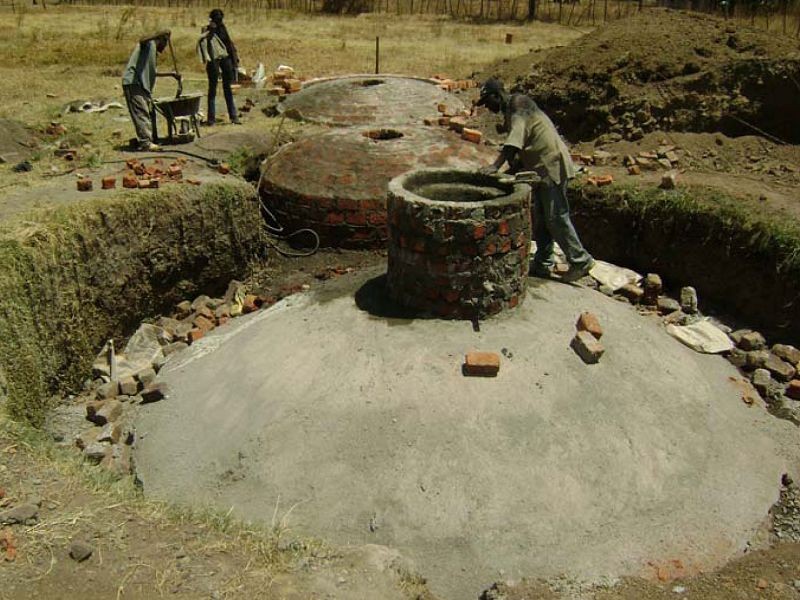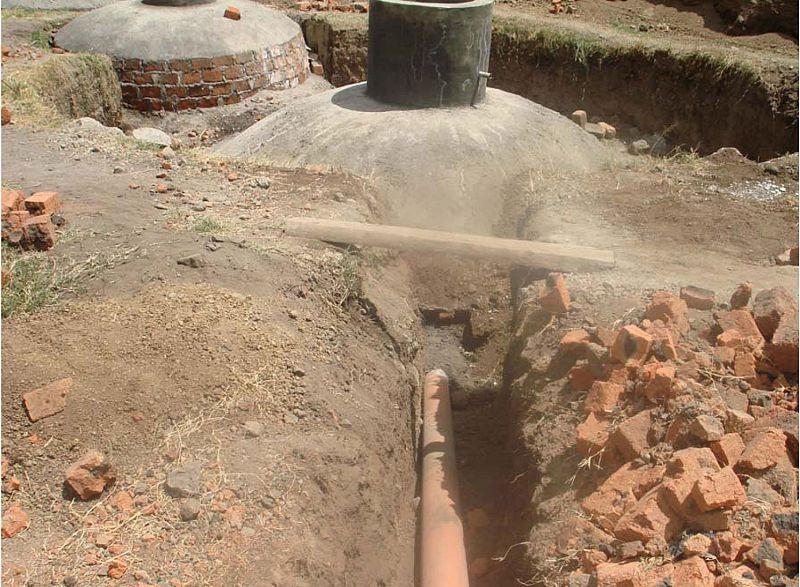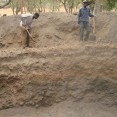To replace firewood with biogas technology for providing clean and sustainable energy at Kenyan Boarding Schools
 In Kenya, nearly all-educational institutions rely on firewood as an energy source for cooking, making the educational sector a major firewood consumer. Such heavy dependence causes environmental problems in the form of deforestation as well as placing a financial burden on the institution itself due to rising firewood prices. To improve the current situation "IT Power Eastern Africa“ initiated a project in which biogas technology was introduced as an alternative energy source.
Although biogas technology is not new in Kenya, many of the installed biogas plants are not operational - due mainly to their incorrect management. This has had negative effects on the acceptance and dissemination of the technology. As a result, a major part of the project has since concentrated on local capacity building and the development and distribution of technical manuals for installers and end users. These efforts should ensure the quality and standardisation of biogas technology.
In the pilot phase, the project targeted two selected boarding schools in the Nakuru area. The chosen substrate for the biogas generation was cow dung. As the schools operate small farms, including farmed livestock, dung is readily available. To ensure the sustainability of the project, a revolving fund for participating institutions and micro-credit institutions was established. In addition, a National Biogas Workshop was held to promote the use of institutional biogas plants to facilitate widespread dissemination of the biogas technology in Kenya.
In Kenya, nearly all-educational institutions rely on firewood as an energy source for cooking, making the educational sector a major firewood consumer. Such heavy dependence causes environmental problems in the form of deforestation as well as placing a financial burden on the institution itself due to rising firewood prices. To improve the current situation "IT Power Eastern Africa“ initiated a project in which biogas technology was introduced as an alternative energy source.
Although biogas technology is not new in Kenya, many of the installed biogas plants are not operational - due mainly to their incorrect management. This has had negative effects on the acceptance and dissemination of the technology. As a result, a major part of the project has since concentrated on local capacity building and the development and distribution of technical manuals for installers and end users. These efforts should ensure the quality and standardisation of biogas technology.
In the pilot phase, the project targeted two selected boarding schools in the Nakuru area. The chosen substrate for the biogas generation was cow dung. As the schools operate small farms, including farmed livestock, dung is readily available. To ensure the sustainability of the project, a revolving fund for participating institutions and micro-credit institutions was established. In addition, a National Biogas Workshop was held to promote the use of institutional biogas plants to facilitate widespread dissemination of the biogas technology in Kenya.
Technology, Operation and Maintenance
 The installed biogas plants have a capacity of 50 m3 and can produce around 10 m3 of biogas per day. Two of the three installed plants were constructed below ground, out of locally available materials. The third
plant, at Nakuru Girls High School, was built above ground. The reason for the different construction method was that the ground at the girls' school proved to be extremely rocky. After various attempts to excavate the ground, the project management decided to build the plant on the surface. This caused a delay, so by the end of the project only the two biogas plants at the Nakuru Boys School were running.
The biogas is transported through a pipeline to the school's kitchen where two biogas stoves were built with cement and are used for boiling water and preparing vegetables. However, the construction of the biogas cookers had to be improved, as they did not initially work properly. The reason for this was that the oxygen supply was insufficient and the flame was inconsistent.
The residues from the biogas generation are used as fertiliser in the school's vegetable garden. During a visit to the project site it was discovered that there were no distribution pipes or storage trenches for the liquid manure, but ways to improve the storage and means of spreading the fertiliser were sought.
The installed biogas plants have a capacity of 50 m3 and can produce around 10 m3 of biogas per day. Two of the three installed plants were constructed below ground, out of locally available materials. The third
plant, at Nakuru Girls High School, was built above ground. The reason for the different construction method was that the ground at the girls' school proved to be extremely rocky. After various attempts to excavate the ground, the project management decided to build the plant on the surface. This caused a delay, so by the end of the project only the two biogas plants at the Nakuru Boys School were running.
The biogas is transported through a pipeline to the school's kitchen where two biogas stoves were built with cement and are used for boiling water and preparing vegetables. However, the construction of the biogas cookers had to be improved, as they did not initially work properly. The reason for this was that the oxygen supply was insufficient and the flame was inconsistent.
The residues from the biogas generation are used as fertiliser in the school's vegetable garden. During a visit to the project site it was discovered that there were no distribution pipes or storage trenches for the liquid manure, but ways to improve the storage and means of spreading the fertiliser were sought.
Financial Issues and Management
In contrast to ten years ago, when firewood was collected from the school's forests, schools now purchase almost all their firewood. Prices have doubled within the last five years, due to the scarcity of firewood in the region. Nakuru Boys High School used about 300 tonnes per year, costing 1 Mio. KSH (around 100,000). The reduction in firewood consumption, due to the use of the biogas plant, means that schools can reduce their expenses significantly. As a result, the cost of the biogas plants can be recouped within 2-3 years and the annual energy costs - paid for by the pupils - are also reduced. To ensure the long-term sustainability of the project, it was very important that the schools financed the installation of the plants themselves. At the beginning, 50% of the total cost was met by the schools while the remaining 50% was provided as a ‘soft loan' through financial assistance from WISIONS. Once this loan is repaid, the money can be lent again to other educational institutions to install biogas technology.Environmental Issues
Reducing firewood use in Kenyan schools can benefit the environment in multiple ways. On the one hand, exertion on the local forest resources can be reduced and deforestation can be avoided. On the other, by saving the forests – which act as a carbon sink – and by replacing firewood with biogas technology, harmful greenhouse gas emissions can be reduced. It was estimated that the carbon emissions saved by the three biogas digesters could amount to 74,500 kg CO2 per year. Due to the fact that the firewood has not yet been totally replaced and because of the delayed installation, this level of reduction has not yet been achieved. In addition to preserving the forest and avoiding emissions, biogas plants can also have positive effects on soil fertility and food productivity due to the fact that slurry from the biogas systems is used as fertiliser for crop farming in the school gardens. To ensure that the manure meets the safety standards for crop production, monitoring must be carried out regularly.Social Issues
The biogas plants were built with the help of local technicians who were guided by experts from the technical team at IT Power Eastern Africa. This approach enabled the team to train and to transfer knowledge to the local technicians. These newly learned and developed skills serve both the technicians and their communities. Additionally, the introduction of biogas technology to the schools significantly reduces the indoor air pollution within the school kitchens.Results & Impact
Three biogas plants have been constructed. Two plants at the Nakuru Boys High School were in operation by the end of the project. The school is already saving firewood and employs one person daily to maintain the biogas plant. While the construction and the initial feeding of the biogas plant at Nakuru Girls High School was complete by the end of the project phase, the piping still needed to be finished. In addition to the construction of the biogas plants, 200 copies of a technical biogas manual for installers and a user manual were produced, printed and distributed.Replicability
 There are around 3000 boarding schools and a further 3000 schools with kitchens in Kenya. All of them use firewood for cooking and could therefore potentially benefit from replacing this energy source with biogas technology. To avoid the problems that have led to most biogas plants in Kenya being dysfunctional, the training of technicians and users will have to be a key factor for the dissemination of the technology. It is absolutely necessary that the digesters are installed using the correct design, that installations are checked by qualified technicians and that the users know how to maintain their plant.
There are around 3000 boarding schools and a further 3000 schools with kitchens in Kenya. All of them use firewood for cooking and could therefore potentially benefit from replacing this energy source with biogas technology. To avoid the problems that have led to most biogas plants in Kenya being dysfunctional, the training of technicians and users will have to be a key factor for the dissemination of the technology. It is absolutely necessary that the digesters are installed using the correct design, that installations are checked by qualified technicians and that the users know how to maintain their plant.
Lessons learned
During the implementation of the biogas plants the project team - and the users - made several discoveries regarding the substrate supply, construction and materials used. Because certain local areas experienced extensive droughts, livestock could not be kept at the dairy as there was insufficient fodder for the animals. This resulted in the need to purchase dung from a farmer to fill the digester for the first time. Problems with the gas pipeline occurred after a few months, so it is necessary that an experienced biogas plant engineer checks the plant after the construction phase is complete to ensure the durability of the technology. A further problem was the stony subsoil at one construction site. IT Power eventually recommended changing the construction approach with the result that one of the biogas plants was built above ground. On a final note, the biogas cooker that was originally constructed required later modifications. The cooker design should, therefore, be optimised right from the start for future projects.Projects with same technology
Validating a Novel Approach to the Productive Use of Biogas to Empower Medium Scale Dairy and Pig Farmers in Costa Rica
This project aims to validate the feasibility of an innovative approach to the productive use of biogas in dairy and pig farms in Costa Rica, avoiding the use of electrical generators.
Biogas Generation through Biomass Production in a "Smart School" in the Lower Northern Region of Thailand
The aim of this project is to use food and agricultural waste, as well as animal dung, to generate biogas energy for producing/cooking school lunches at seven schools in Thailand.
Projects in same country
Integrating Solar Powered Drip Irrigation with Sustainable Charcoal Production
Promoting sustainable livelihoods at Lake Victoria by introducing solar lamps for night fishing
To replace kerosene lights for night fishing by introducing energy hubs to power sustainable lighting systems